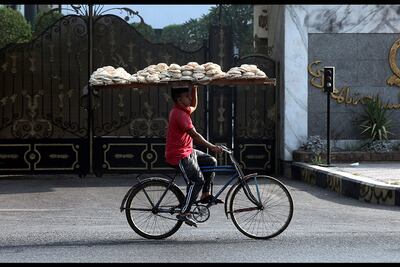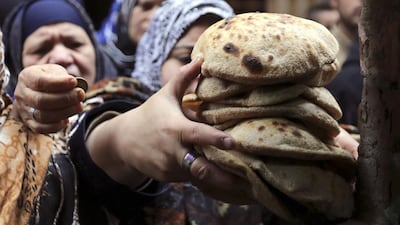Egypt’s President Abdel Fattah El Sisi on Wednesday told newlyweds that the authorities would not issue subsidised food cards for more than two people and that they should not expect the state to feed their children.
“There is a culture entrenched in people’s heads and which does not exist anywhere except Egypt and that is you can buy stuff for less than its value, receive a service for less than its cost and have children and expect someone else to feed them,” he said.
About 60 per cent Egypt's population of 102 million people have access to food cards which grant their holders access to basic food items at heavily subsidised prices. The items include staples such as sugar, rice, pasta, bread and cooking oil.
"There is no way we will be issuing cards to couples who get married and expect the state to give them the cards. So, you cannot afford [living costs]? How come?”
Subsidy cards are issued by the Ministry of Supply. For decades, beneficiaries have been able to routinely add new family members. In 2017, the government capped the number of relatives who would be added to the card to four.
The Egyptian leader’s comments were made during a televised ceremony to inaugurate development projects in the southern province of Assiut, one of the country’s poorest regions.
His comments touched on diverse domestic topics, including Egypt’s rapidly growing population, urban encroachment on farmland and the construction of housing projects to dissuade Egyptians from building near the Nile banks.
Lifting costly state subsidies has been a cornerstone of Mr El Sisi’s economic reform programme, which has since 2016 won accolades from international financial agencies. The measures led to steep price hikes in the country, where the majority struggle to meet basic living costs.

In August, the president said it was time to raise the price of the state-subsidised bread, the main staple in the diet of most Egyptians. His comment sent shockwaves through the country, which was rocked by deadly riots in 1977 when the president at the time, Anwar Sadat, decreed and later reversed a bread price rise.
The Egyptian government has repeatedly said subsidies are a heavy burden on its finances. In recent years, it has annulled millions of ration cards on the grounds that their holders earned enough to buy food on the free market.
President El Sisi has led a high-octane development drive since taking office in 2014, overhauling an economy battered by the political turmoil that followed the 2011 uprising and embarking on vast construction projects.
He has overseen the creation of at least 12 new cities, including an ultra-modern capital in the desert east of Cairo. His government has spent billions of dollars on building new power stations, water desalination and treatment plants and thousands of kilometres of new roads, as well as bridges and low-cost housing.


